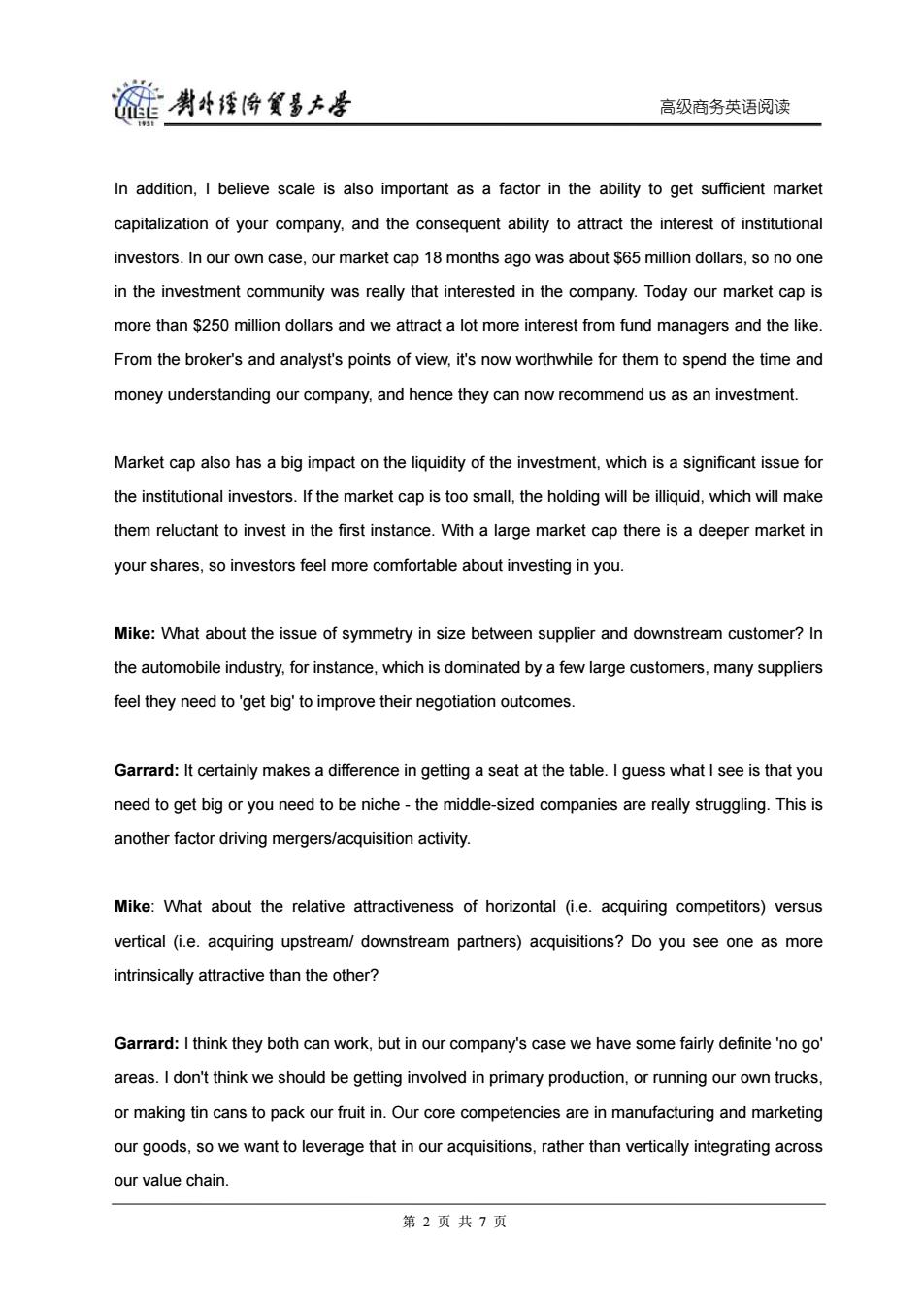正在加载图片...

能男华经降贸多大星 高级商务英语阅读 In addition,I believe scale is also important as a factor in the ability to get sufficient market capitalization of your company.and the consequent ability to attract the interest of institutional investors.In our own case,our market cap 18 months ago was about $65 million dollars,so no one in the investment community was really that interested in the company.Today our market cap is more than $250 million dollars and we attract a lot more interest from fund managers and the like. From the broker's and analyst's points of view,it's now worthwhile for them to spend the time and money understanding our company,and hence they can now recommend us as an investment. Market cap also has a big impact on the liquidity of the investment,which is a significant issue for the institutional investors.If the market cap is too small,the holding will be illiquid,which will make them reluctant to invest in the first instance.With a large market cap there is a deeper market in your shares,so investors feel more comfortable about investing in you. Mike:What about the issue of symmetry in size between supplier and downstream customer?In the automobile industry,for instance,which is dominated by a few large customers,many suppliers feel they need to 'get big'to improve their negotiation outcomes. Garrard:It certainly makes a difference in getting a seat at the table.I guess what I see is that you need to get big or you need to be niche-the middle-sized companies are really struggling.This is another factor driving mergers/acquisition activity. Mike:What about the relative attractiveness of horizontal (i.e.acquiring competitors)versus vertical (i.e.acquiring upstream/downstream partners)acquisitions?Do you see one as more intrinsically attractive than the other? Garrard:I think they both can work,but in our company's case we have some fairly definite 'no go' areas.I don't think we should be getting involved in primary production,or running our own trucks, or making tin cans to pack our fruit in.Our core competencies are in manufacturing and marketing our goods,so we want to leverage that in our acquisitions,rather than vertically integrating across our value chain. 第2页共7页高级商务英语阅读 In addition, I believe scale is also important as a factor in the ability to get sufficient market capitalization of your company, and the consequent ability to attract the interest of institutional investors. In our own case, our market cap 18 months ago was about $65 million dollars, so no one in the investment community was really that interested in the company. Today our market cap is more than $250 million dollars and we attract a lot more interest from fund managers and the like. From the broker's and analyst's points of view, it's now worthwhile for them to spend the time and money understanding our company, and hence they can now recommend us as an investment. Market cap also has a big impact on the liquidity of the investment, which is a significant issue for the institutional investors. If the market cap is too small, the holding will be illiquid, which will make them reluctant to invest in the first instance. With a large market cap there is a deeper market in your shares, so investors feel more comfortable about investing in you. Mike: What about the issue of symmetry in size between supplier and downstream customer? In the automobile industry, for instance, which is dominated by a few large customers, many suppliers feel they need to 'get big' to improve their negotiation outcomes. Garrard: It certainly makes a difference in getting a seat at the table. I guess what I see is that you need to get big or you need to be niche - the middle-sized companies are really struggling. This is another factor driving mergers/acquisition activity. Mike: What about the relative attractiveness of horizontal (i.e. acquiring competitors) versus vertical (i.e. acquiring upstream/ downstream partners) acquisitions? Do you see one as more intrinsically attractive than the other? Garrard: I think they both can work, but in our company's case we have some fairly definite 'no go' areas. I don't think we should be getting involved in primary production, or running our own trucks, or making tin cans to pack our fruit in. Our core competencies are in manufacturing and marketing our goods, so we want to leverage that in our acquisitions, rather than vertically integrating across our value chain. 第 2 页 共 7 页